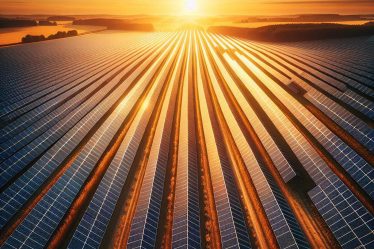
Hey there, folks! Ready to dive into the enlightening world of solar power? Get ready to uncover the incredible impact of harnessing the sun’s energy in driving sustainable development. From slashing carbon emissions to empowering communities, solar power is an absolute game-changer. In this article, we’ll explore the myriad benefits and far-reaching implications of solar energy. So buckle up and join me as we shine a light on how this renewable resource is shaping a brighter, cleaner future for generations to come. Let’s embark on this illuminating journey together!
Introduction to Solar Power
Solar power plays a crucial role in driving sustainable development goals by providing clean, renewable energy. With the sun’s abundant and free energy, solar power offers an environmentally friendly alternative to traditional fossil fuels. This helps reduce greenhouse gas emissions and combat climate change, while also promoting energy access and security, especially in remote areas. Furthermore, solar power creates economic opportunities and jobs within local communities.
The adoption of solar power contributes significantly to achieving sustainable development targets related to affordable and clean energy (SDG 7), climate action (SDG 13), and partnerships for the goals (SDG 17). By harnessing solar energy through photovoltaic panels or concentrated solar power systems, individuals, businesses, and governments can reduce their reliance on non-renewable resources. Moreover, the decentralized nature of solar power empowers communities to become self-sufficient in meeting their energy needs.
Embracing solar power is essential for advancing sustainability worldwide. Its widespread implementation not only mitigates environmental impacts but also fosters social progress and economic growth.
Benefits of Solar Power
Solar power is a clean and renewable source of energy that plays a crucial role in sustainable development. It offers numerous benefits, including:
- Environmental Impact: Solar power reduces greenhouse gas emissions, helping to combat climate change and decrease air pollution.
- Economic Advantages: Investing in solar energy can lead to cost savings on electricity bills and create job opportunities in the growing renewable energy sector.
- Energy Accessibility: Solar panels can provide electricity to remote areas without access to the traditional power grid, improving energy equity.
- Resource Sustainability: Unlike fossil fuels, solar power harnesses energy from the sun, an abundant and inexhaustible resource.
In addition to these benefits, solar power also contributes to achieving Sustainable Development Goals by promoting clean energy production and supporting global efforts towards environmental conservation.
Solar Power and Environmental Sustainability
Solar power plays a crucial role in helping our environment stay healthy. By harnessing the energy from the sun, we can generate electricity without emitting harmful greenhouse gases that contribute to climate change. In fact, solar power is one of the cleanest and most abundant renewable energy sources available today. It helps reduce our reliance on fossil fuels, lowers air pollution, and conserves natural resources. As a result, embracing solar power not only benefits the environment but also promotes sustainable development for future generations.
Additionally, integrating solar power into communities can boost local economies and create job opportunities while providing affordable and reliable electricity. This means that more people can access clean energy, improving their quality of life without compromising the needs of future generations.
Economic Impact of Solar Power

Solar power has a big impact on the money stuff. When businesses and homes use solar power, they can save lots of cash in the long run. It’s like an investment that pays for itself over time. Solar power also creates jobs, which is good for the economy. People need to make the solar panels and install them, so it gives folks work.
The economic benefits of solar power go hand in hand with helping the environment. By using renewable energy sources like solar power, we can reduce our reliance on non-renewable resources and cut down on pollution. This means cleaner air to breathe and a healthier planet for future generations. Plus, when businesses and homes use less electricity from the grid, it helps keep costs down for everyone!
Social Implications of Solar Power Adoption
Solar power has big impacts on people and communities. When solar panels go up, it means cleaner air and healthier folks. Plus, it creates jobs, like those who install and maintain the panels. But we gotta make sure everyone can access this green energy revolution – no one should be left in the dark.
The switch to solar also puts power back in people’s hands. With rooftop panels or community projects, folks can take charge of their own energy needs. This can lead to more independence from big energy companies and lower bills for families. It’s like taking control of your destiny while doing good for the planet.
But hey, there are some things to consider too. We need to make sure that as we grow solar power, we’re not leaving anyone behind – especially those who might struggle with change or have less cash to splash around. It’s all about making sure everyone benefits from the sunny side of life!
Conclusion: The Future of Solar Power
As we look ahead, it’s crystal clear that solar power is set to play a pivotal role in steering us towards a more sustainable future. With its renewable nature and abundant supply, solar power stands as a cornerstone for powering homes, businesses, and communities while reducing our reliance on fossil fuels. The ongoing advancements in solar technology are making it even more accessible and efficient, driving the momentum toward widespread adoption.
The integration of solar energy into our infrastructure not only paves the way for cleaner air and reduced carbon emissions but also opens up opportunities for economic growth and job creation. It’s becoming increasingly evident that investing in solar power isn’t just an environmental choice – it’s a smart financial move too. As countries worldwide strive to meet their sustainable development goals, harnessing the power of the sun presents itself as an indispensable solution.
Embracing solar power is not merely an option; it’s a necessity if we’re committed to building a greener tomorrow. By leveraging this boundless source of clean energy, we can make significant strides towards mitigating climate change while empowering communities across the globe. The journey toward a sustainable future is undoubtedly challenging, but with solar energy
Questions and Answers
1. What is the role of solar power in sustainable development?
Solar power plays a crucial role in sustainable development by providing clean, renewable energy that reduces reliance on fossil fuels and mitigates greenhouse gas emissions.
2. How does solar power contribute to achieving sustainable development goals?
Solar power contributes to achieving sustainable development goals by promoting energy access, fostering economic growth, creating jobs, and improving energy security.
3. What are the environmental benefits of solar power in sustainable development?
Solar power offers environmental benefits in sustainable development by reducing air and water pollution, conserving natural resources, and minimizing ecological impacts compared to traditional energy sources.
4. In what ways can solar power support communities in achieving sustainability?
Solar power can support communities in achieving sustainability by providing affordable and reliable electricity, especially in remote areas, while empowering local economies and enhancing resilience to climate change impacts.



